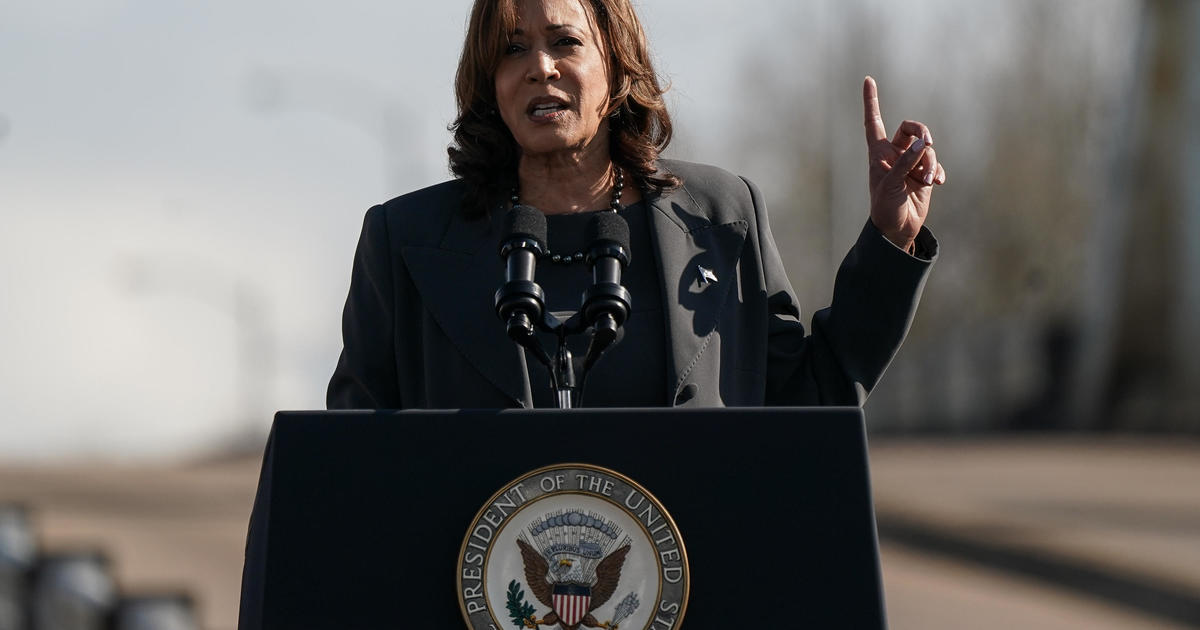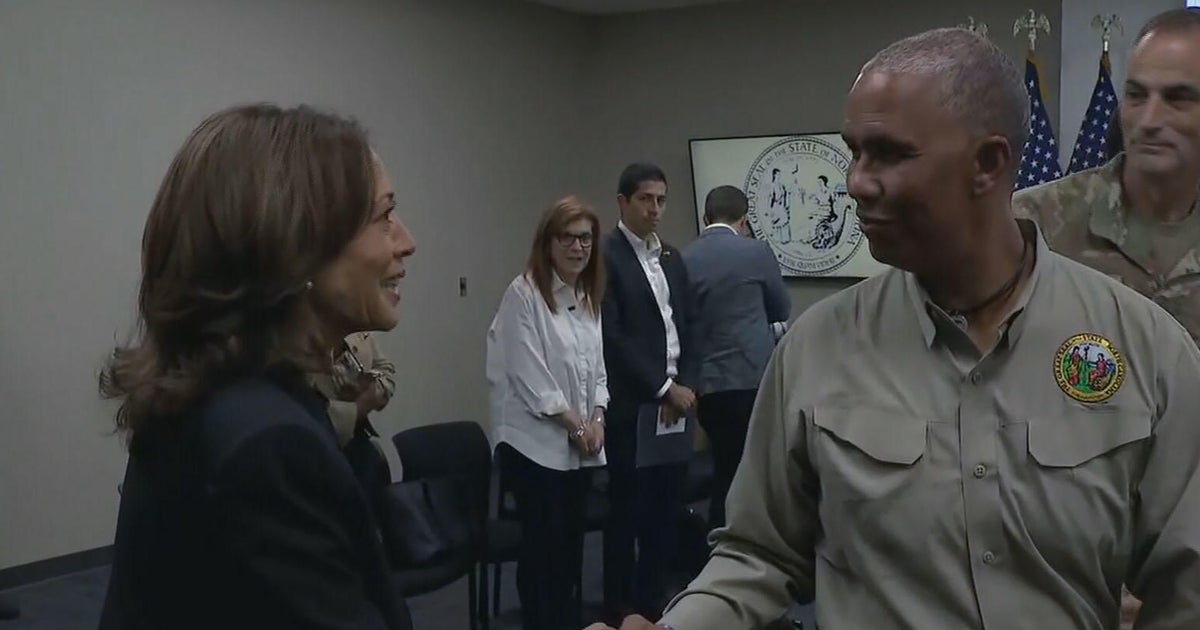CBS News
Kamala Harris calls for Israel-Hamas war immediate cease-fire “given the immense scale of suffering” in Gaza

Rania Abu Anza’s twins, a boy and a girl, were conceived after she spent more than a decade and three rounds of fertility treatments trying to become a mother. At just six months old, they were both killed Saturday, along with at least 14 other members of the Abu Anza family, in an Israeli strike on the southern Gaza city of Rafah.
“What did these babies do,” the bereaved mother asked, holding her babies’ bodies. “What are you doing? Just watching us die?”
After nearly five months of a war that has killed some 30,000 people in Gaza, according to its Hamas-run Health Ministry, the Biden administration issued its fiercest criticism of the conflict to date Sunday, with Vice President Kamala Harris labeling the situation in the Gaza Strip a “humanitarian catastrophe” and calling for an “immediate cease-fire.”
“People in Gaza are starving. The conditions are inhumane and our common humanity compels us to act,” Harris said at an event commemorating “Bloody Sunday” in Selma, Alabama, where state troopers beat civil rights marchers on the Edmund Pettus Bridge nearly 60 years ago.
Elijah Nouvelage/Getty
Harris called for the Israeli government to do more to increase the flow of aid to Gaza to ease the suffering there, adding that there could be “no excuses.”
She said the threat that Hamas poses to the people of Israel “must be eliminated,” but added that, “given the immense scale of suffering in Gaza, there must be an immediate cease-fire for at least the next six weeks, which is what is currently on the table.”
The U.S. conducted its first airdrops of food aid into Gaza on Saturday, one day before a Hamas delegation arrived in Cairo for continued cease-fire talks. A U.S. official said Israel had agreed on the framework for a truce deal, but Israeli media reported that the country’s government then boycotted the talks on Sunday because Hamas had rejected its demand for a complete list of hostages who are still alive.
“Hamas claims it wants a cease-fire. Well, there is a deal on the table. And as we have said, Hamas needs to agree to that deal,” Harris said in Selma on Sunday. “Let’s get a cease-fire. Let’s reunite the hostages with their families. And let’s provide immediate relief to the people of Gaza.”
Senior Hamas official Basem Naim told CBS News partner network BBC News that the group was unable to compile a complete list of surviving hostages.
“Practically, it is impossible to know who is still alive,” Naim said. There are still believed to be about 130 Israeli hostages held in Gaza. Hamas seized about 240 people as hostages during its Oct. 7 terror attack, which sparked the ongoing war, but it is not believed to have retained control over all of them during the conflict. About 100 of the hostages were released during a previous short-term truce in November.
The Biden administration has repeatedly said a cease-fire deal is close, and the White House has been pushing to have it in place by the start of Ramadan on March 10.
Israeli war cabinet member Benny Gantz was in Washington on Monday, meanwhile, to meet with Harris, where the U.S. vice president was expected to deliver a similarly forceful message.
Pressure for a cease-fire and hostage release deal has also been intensifying across Israel.
The families of those still being held in Gaza, along with supporters, marched in Jerusalem this weekend demanding Prime Minister Netanyahu agree to an immediate truce with Hamas.
Among them was Shay Dickman, who wants her cousin Carmel freed.
“I really want to hope that [Netanyahu] puts people’s lives in first priority,” ahead of the war, Dickman told CBS News.
CBS News correspondent Imtiaz Tyab contributed to this report.
CBS News
Tajikistan nationals with alleged ISIS ties removed in immigration proceedings, U.S. officials say

When federal agents arrested eight Tajikistan nationals with alleged ties to the Islamic State terror group on immigration charges back in June, U.S. officials reasoned that coordinated raids in Los Angeles, New York and Philadelphia would prove the fastest way to disrupt a potential terrorist plot in its earliest stages. Four months later, after being detained in Immigration and Customs Enforcement (ICE) facilities, three of the men have already been returned to Tajikistan and Russia, U.S. officials tell CBS News, following removals by immigration court judges.
Four more Tajik nationals – also held in ICE detention facilities – are awaiting removal flights to Central Asia, and U.S. officials anticipate they’ll be returned in the coming few weeks. Only one of the arrested men still awaits his legal proceeding, following a medical issue, though U.S. officials speaking on the condition of anonymity to discuss the sensitive proceedings indicated that he remains detained and is likely to face a similar outcome.
The men face no additional charges – including terrorism-related offenses – with the decision to immediately arrest and remove them through deportation proceedings, rather than orchestrate a hard-fought terrorism trial in Article III courts, born out of a pressing short-term concern about public safety.
Soon after the eight foreign nationals crossed into the United States, the FBI learned of the potential ties to the Islamic State, CBS News previously reported. The FBI identified early-stage terrorist plotting, triggering their immediate arrests, in part, through a wiretap after the individuals had already been vetted by U.S. Customs and Border Protection, law enforcement sources confirmed to CBS News in June.
Several months later, their removals following immigration proceedings mark a departure from the post-9/11 intelligence-sharing architecture of the U.S. government.
Now facing a more diverse migrant population at the U.S.-Mexico border, a new effort is underway by the Department of Homeland Security, Department of Justice and the Intelligence Community to normalize the direct sharing of classified information – including some marked top-secret – with U.S. immigration judges.
The more routine intelligence sharing with immigration judges is aimed at allowing U.S. immigration courts to more regularly incorporate derogatory information into their decisions. The endeavor has led to the creation of more safes and sensitive compartmented information facilities – also known as SCIFs – to help facilitate the sharing of classified materials. Once considered a last resort for the department, Secretary Alejandro Mayorkas has sought to use immigration tools, in recent months, to mitigate and disrupt threat activity.
The immigration raids, back in June, underscore the spate of terrorism concerns from the U.S. government this year, as national security agencies point to a system now blinking red in the aftermath of the Oct. 7 attacks by Hamas on Israel, with emerging terrorism hot spots in Central Asia.
A joint intelligence bulletin released this month, and obtained by CBS News, warns that foreign terrorist organizations have exploited the attack nearly one year ago and its aftermath to try to recruit radicalized followers, creating media that compares the October 7 and 9/11 attacks and encouraging “lone attackers to use simple tactics like firearms, knives, Molotov cocktails, and vehicle ramming against Western targets in retaliation for deaths in Gaza.”
In May, ICE arrested an Uzbek man in Baltimore with alleged ISIS ties after he had been living inside the U.S. for more than two years, NBC News first reported.
In the past year, Tajik nationals have engaged in foiled terrorism plots in Russia, Iran and Turkey, as well as Europe, with several Tajik men arrested following March’s deadly attack on Crocus City Hall in Moscow that left at least 133 people dead and hundreds more injured.
The attack has been linked to ISIS-K, or the Islamic State Khorasan Province, an off-shoot of ISIS that emerged in 2015, founded by disillusioned members of Pakistani militant groups, including Taliban fighters. In August 2021, during the U.S. military withdrawal from Afghanistan, ISIS-K launched a suicide attack in Kabul, killing 13 U.S. service members and at least 170 Afghan civilians.
In a recent change to ICE policy, the agency now recurrently vets foreign nationals arriving from Tajikistan, Uzbekistan and other Central Asian countries, detaining them while they await removal proceedings or immigration hearings.
Only 0.007% of migrant arrivals are flagged by the FBI’s watchlist, and an even smaller number of those asylum seekers are ultimately removed. But with migrants arriving at the Southwest border from conflict zones in the Eastern Hemisphere, posing potential links to extremist or terrorist groups, the White House is now exploring ways to expedite the removal of asylum seekers viewed as a possible threat to the American public.
“Encounters with migrants from Eastern Hemisphere countries—such as China, India, Russia, and western African countries—in FY 2024 have decreased slightly from about 10 to 9 percent of overall encounters, but remain a higher proportion of encounters than before FY 2023,” according to the Homeland Threat Assessment, a public intelligence document released earlier this month.
A senior homeland security official told reporters in a briefing Wednesday, that the U.S. is engaged in an “ongoing effort to try to make sure that we can use every bit of available information that the U.S. government has classified and unclassified, and make sure that the best possible picture about a person seeking to enter the United States is available to frontline personnel who are encountering that person.”
Approximately 139 individuals flagged by the FBI’s terror watchlist have been encountered at the U.S.‑Mexico border through July of fiscal year 2024. That number decreased from 216 during the same timeframe in 2023. CBP encountered 283 watchlisted individuals at the U.S.-Canada border through July of fiscal year 2024, down from 375 encountered during the same timeframe in 2023.
“I think one of the features of the surge in migration over recent years is that our border personnel are encountering a much more diverse and global population of individuals trying to enter the United States or seeking to enter the United States,” a senior DHS official said. “So, at some point in the past, it might have been primarily a Western Hemisphere phenomenon. Now, our border personnel encounter individuals from around the world, from all parts of the world, to include conflict zones and other areas where individuals may have links or can support ties to extremist or terrorist organizations that we have long-standing concerns about.”
In April, FBI Director Christopher Wray warned that human smuggling operations at the southern border were trafficking in people with possible connections to terror groups.
“Looking back over my career in law enforcement, I’d be hard-pressed to think of a time when so many different threats to our public safety and national security were so elevated all at once, but that is the case as I sit here today,” Wray, told Congress in June, just days before most of the Tajik men were arrested.
The expedited return of three Tajiks to Central Asia required tremendous diplomatic communication, facilitated by the State Department, U.S. officials said.
Returns to Central Asia routinely encounter operational and diplomatic hurdles, though regular channels for removal do exist. According to agency data, in 2023, ICE deported only four migrants to Tajikistan.
Robert Legare and
contributed to this report.
CBS News
Here Comes the Sun: Ralph Macchio and more

Watch CBS News
Be the first to know
Get browser notifications for breaking news, live events, and exclusive reporting.
CBS News
The Depraved Heart Murder – CBS News

Watch CBS News
Be the first to know
Get browser notifications for breaking news, live events, and exclusive reporting.









